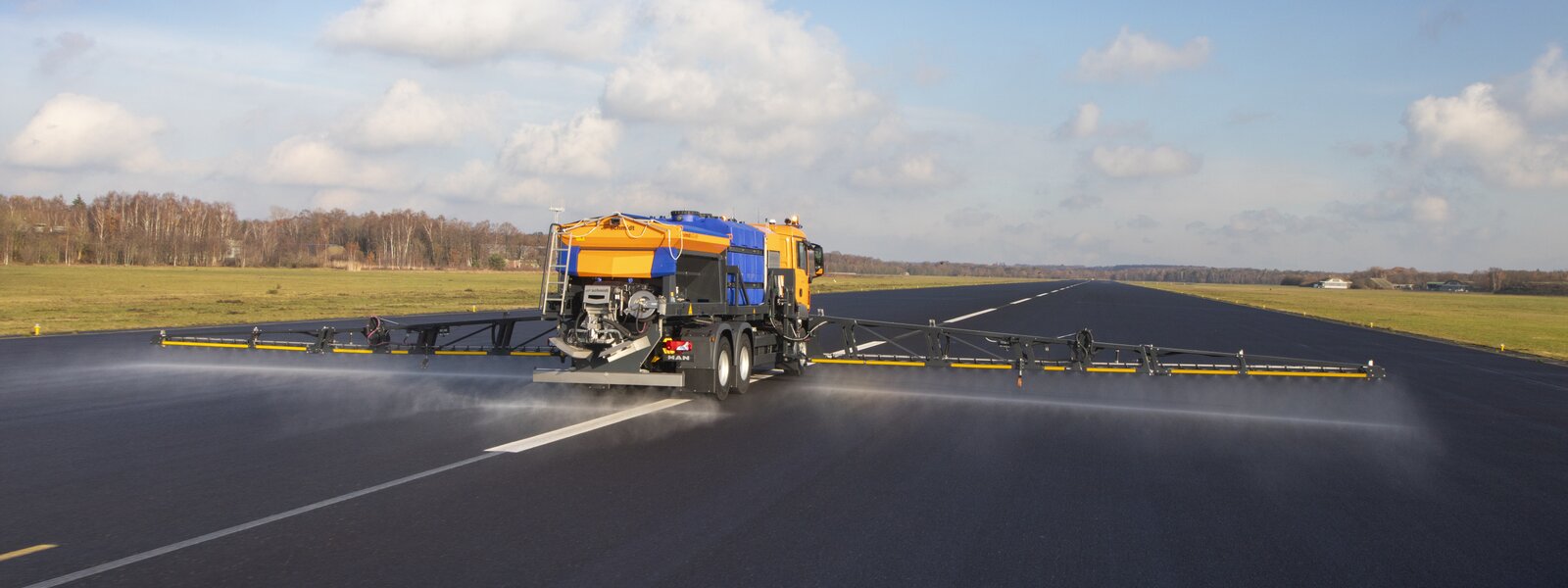Marc discovered his passion for sophisticated, IT-driven processes in his previous career in logistics and transport management at PostNL. He started at Schiphol in 2017, and today he is responsible for functional application management, overseeing applications related to baggage, planning and forecasting as well as general airside operations. Schiphol Airport has a lot of experience with telematics solutions, having first employed such solutions as far back as the nineties, and has recently updated to the latest version of our IntelliOPS platform.
While IntelliOPS boasts many useful features, Schiphol’s winter operations team and the control tower primarily use the platform to proactively manage operations. With IntelliOPS, Schiphol can constantly track the progress of operations, is able to see in real time what the winter fleet is doing and can instantly intervene whenever there’s a deviation from planned operations. “When weather conditions change, we need to start spraying our runways and clearing snow in close collaboration with the tower and ground operations, usually in a short space of time,” says Marc. “Imagine in such a situation if we had to coordinate those operations from the tower using mobile phones and on sight. Not only would that be tedious, but above all it would be prone to errors. We prefer to avoid such risks with the help of digital solutions where possible, and now to a large extent we can.” During winter operations, IntelliOPS has become an important monitoring ‘hub’ for the team, enabling management to take decisions more quickly. This is in no small part due to operations being mainly controlled from the winter service operations room, which is equipped with large video walls. Of course, collaboration with the other control units is crucial, and the tower’s ability to monitor the operations live and on screen is very helpful as well. “We see more and we see better. Overall, the system has become more intuitive,” says Marc, but immediately adds that there are still a few features he wishes to see in the next version of the platform. In addition to new functionalities, Schiphol is already thinking further ahead, and has started to evaluate if and how it can connect IntelliOPS to the Schiphol Group data warehouse and to its own GIS-based map servers.

Humans are still in charge, but the system is a great help
IntelliOPS offers great support for documenting and reporting activities to external authorities. What used to be a time-consuming process now requires hardly any resources. For example, IntelliOPS provides data to other internal systems at Schiphol, which are then used to report to the Dutch water authority. Marc adds that much of the data and reports are also shared internally as well as the basis for invoicing services when subcontractors are part of the operations.

And the drivers? They have a lot of responsibility and their experience is highly valuable. In future, will the systems tell them what to do? “No. It’s still the humans in tower, operations centre and on the ground that are in control. We also have spraying and clearing scenarios ready for specific situations which help us save deployment time and which ease the monitoring together with live and/or historical data from IntelliOPS. These scenarios are improved continuously by our winter operations department together with lead drivers, as their experience remains essential to translate practice to sound new scenarios to be used in the future.”
Will Schiphol have to stop operations if the system were to suddenly stop working? No, absolutely not, says Marc, noting that everything can still be done manually if necessary. Nevertheless, the benefits the system brings are clear. “I think IntelliOPS is extremely important together with other systems such as weather applications. It saves us a lot of time and effort. We can make better and faster decisions with it.” Marc is convinced that digitalisation and data are very important for future developments at the airport. For him, it is also essential that the airport remains independent when making purchasing decisions for equipment and vehicles to ensure that the airport gets the best possible solution. A prerequisite for this is that systems like IntelliOPS must be able to process data from different vehicles and manufacturers.

Good partners always surprise each other
Marc has a clear idea of what a healthy partnership entails. As he explains: “We expect our partners to take the term 'partner' seriously. That requires them to get actively involved, drawing attention to problems on their own initiative and suggesting improvements. And we expect solution-oriented thinking and working, because it is the nature of our mission that there are always new challenges that we have to solve.” With upcoming challenges and other IntelliOPS features in mind, we naturally wanted to know if and how IntelliOPS can ease the processes for non-winter operations such as regular sweeping in warmer months. Some of its functionalities are already used to support FOD documentation and reporting. “However, the operations are somewhat less complex and therefore the need to also pro-actively plan sweeping routes is less urgent,” says Marc. “But yes, I definitely see potential to utilise the system even more. If we take the partnership seriously, we will be able to keep surprising each other with good things.”
We thank Marc and Amsterdam Airport Schiphol for the interview and giving us their time.
